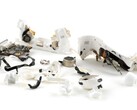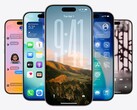Post a successful bend test conducted by popular YouTuber JerryRigEverything, independent breakability testing conducted by Allstate Protection Plans has revealed that Apple’s new iPhone Air and iPhone 17 Pro are still prone to a fair amount of damage when subjected to gravity. The testing used robotic equipment, including its "DropBot" and "BendBot", to replicate common accidents. Both devices survived controlled bend tests without losing functionality, but both shattered when dropped face-down from six feet.
During the drop tests, the iPhone Air and iPhone 17 Pro were still operational after impact, though their new Ceramic Shield 2 front displays broke immediately upon a face-down fall. When dropped back-down, the iPhone 17 Pro sustained only cosmetic damage, while the Air developed cracks across its rear panel but kept functioning. As per Allstate, this happened because of the new Ceramic Shield rear panels that replace the previous glass-back iPhone models.
In the Allstate bend tests, the iPhone 17 Pro bent at 200 pounds of pressure and the iPhone Air at 190 pounds - however, they were both functioning normally afterward. While these figures were lower than the iPhone 17 Pro Max’s 240-pound resistance, they still exceed industry durability standards. The iPhone Air, which is nearly 35 percent thinner than the iPhone 17 Pro, nearly matched its strength - likely because of the rectangular camera housing and titanium frame, Allstate adds.
As per Jason Siciliano (VP of marketing at Allstate Protection Plans), iPhone 17 users should ideally use protective accessories with their devices, since repair costs for the 17 Pro and Air can be as high as $749 and $699 respectively (without AppleCare).
Buy the Spigen tempered glass screen protector for the iPhone 17 Pro on Amazon.





















